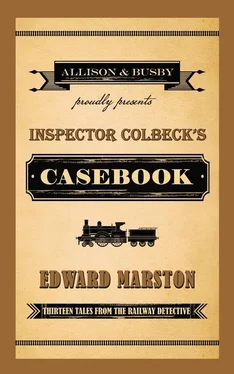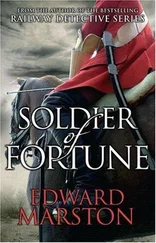Edward Marston - Inspector Colbeck's Casebook
Здесь есть возможность читать онлайн «Edward Marston - Inspector Colbeck's Casebook» весь текст электронной книги совершенно бесплатно (целиком полную версию без сокращений). В некоторых случаях можно слушать аудио, скачать через торрент в формате fb2 и присутствует краткое содержание. Год выпуска: 2014, ISBN: 2014, Издательство: Allison & Busby, Жанр: Исторический детектив, на английском языке. Описание произведения, (предисловие) а так же отзывы посетителей доступны на портале библиотеки ЛибКат.
- Название:Inspector Colbeck's Casebook
- Автор:
- Издательство:Allison & Busby
- Жанр:
- Год:2014
- ISBN:9780749014742
- Рейтинг книги:4 / 5. Голосов: 1
-
Избранное:Добавить в избранное
- Отзывы:
-
Ваша оценка:
- 80
- 1
- 2
- 3
- 4
- 5
Inspector Colbeck's Casebook: краткое содержание, описание и аннотация
Предлагаем к чтению аннотацию, описание, краткое содержание или предисловие (зависит от того, что написал сам автор книги «Inspector Colbeck's Casebook»). Если вы не нашли необходимую информацию о книге — напишите в комментариях, мы постараемся отыскать её.
Inspector Colbeck's Casebook — читать онлайн бесплатно полную книгу (весь текст) целиком
Ниже представлен текст книги, разбитый по страницам. Система сохранения места последней прочитанной страницы, позволяет с удобством читать онлайн бесплатно книгу «Inspector Colbeck's Casebook», без необходимости каждый раз заново искать на чём Вы остановились. Поставьте закладку, и сможете в любой момент перейти на страницу, на которой закончили чтение.
Интервал:
Закладка:
‘I’m so glad that we were able to rescue her, sir,’ he said.
‘You were the one who spotted her through the window, Victor.’
‘Yes, but it was you who eventually got us to the right house.’
‘I was sure that we were looking for a wealthy man with a passion for music,’ explained Colbeck. ‘That meant he would certainly have a piano in the house and make sure that it was looked after properly. I simply had to make a list of gentlemen in the city who fitted that description. That’s why I called on expert advice.’
‘It was a stroke of genius, sir,’ said Leeming. ‘We may get the credit but this was the first case I know that was really solved by a blind piano tuner.’
SUFFER LITTLE CHILDREN
Ben Grosvenor was a lugubrious man with such a jaundiced view of the human condition that his colleagues either mocked him or avoided his mournful diatribes. At the end of the week, however, Grosvenor acquired an instant popularity because he was one of the pay clerks for the London and North Western Railway. As he went on his rounds, doling out money from his leather bag, he was always welcomed with a cheer. That morning was no exception. When he approached a group of cleaners in the carriage shed, he set off a chorus of approval. They stopped working at once and rubbed their hands. Grosvenor was a skinny beanpole of a man in his fifties with a beaky nose on which a pair of wire-framed spectacles was perched. A stickler for the rule book, he kept a pencil behind his ear and used it to record every penny that was handed over. He put his bag down on the ground.
‘Is it true that we have double wages this week, Ben?’ joked someone.
‘That’ll be the day!’ moaned Grosvenor.
‘Can’t you slip us a bit extra out of the kindness of your heart?’
‘ What heart?’ asked another man. Everyone laughed.
‘If you’re going to poke fun,’ warned Grosvenor, ‘I can leave you all to the end of my round so you’ll have to wait a couple of hours before you see your money.’
‘We want it now,’ said a big man with bulging forearms, ‘and we’re not poking fun at you, Ben. We love you, really. Isn’t that so?’
Everyone agreed wholeheartedly. One man even embraced the pay clerk.
Opening his bag and checking everything against his ledger, he paid them one by one before snapping his bag shut. The men had to listen to his doom-laden prophecies about the dire future of mankind for a few minutes but, with money in their pockets, they were happy to do so. When he picked up his bag and walked away, they gave him a rousing cheer.
Grosvenor’s next stop was some distance away. He had to pay men at work repairing the track. They, too, gave him a cordial welcome and lined up eagerly to get their wages. Grosvenor kept them waiting so that he could unload some of his sour opinions of life on them. He then opened his bag and reached in it for his ledger.
To his horror, it was not there and neither was the money. He was staring at a small pile of ballast. Lifting up the bag, he examined it more closely. Though similar in every way, it was not his. He clutched at his throat.
‘Come on, Ben,’ urged someone. ‘Give us our wages.’
‘I can’t,’ said Grosvenor in despair. ‘I’ve been robbed.’
Since their husbands worked so closely together, Madeleine Colbeck had become friendly with Estelle Leeming. They saw each other infrequently but, when they did get together, it was always a pleasurable occasion. It was Caleb Andrews who suggested a possible outing and Madeleine was at once grateful for the offer yet wary of accepting it.
‘I’m in two minds,’ she admitted.
‘But you love going to the engine shed, Maddy. When you first took up painting, you badgered me to take you there whenever I could.’
‘I know, Father. It’s an inspiration to me. I’ve had some of my best ideas in that shed. It’s not me that I’m worried about. It’s the two boys.’
‘They’ll be thrilled. All boys of their age want to be an engine driver.’
‘Don’t exaggerate.’
‘They do,’ he said. ‘If they knew what it was really like, of course, they might not be so keen. They’re too young to realise the dangers involved, not to mention the effort it takes. Long days on the footplate are very tiring and you come home filthy.’
‘You don’t need to tell me that, Father,’ she reminded him. ‘When I was living at home, I saw the state of your clothes. As for the outing, my only concern is that David and Albert can be boisterous. Estelle says they sometimes run her ragged.’
‘They just need a strong hand.’
‘They get that when their father is there but, like Robert, he’s often away for extended periods. Estelle struggles to cope without Victor there.’ She paused to think it over. Reaching a decision, she gave an affirmative nod. ‘We’ll take them. It’s unkind to deprive them of a treat like this and Estelle will have us to help look after them. They’re good boys at heart. They just lack discipline.’
‘Not when I’m around, they won’t,’ said Andrews, tapping his chest. ‘I’ll keep them on a short leash. I’ll have to, Maddy. When I asked for permission to take them there, the manager insisted that the lads behaved themselves.’
‘Let’s hope that they do,’ said Madeleine.
But she had lurking doubts.
When Estelle turned up at the house with her sons, it was clear that they were on their best behaviour. Smartly dressed and with gleaming faces, they spoke respectfully as they thanked Andrews for arranging the outing. David Leeming was the elder of the two brothers, a chunky ten-year old with an unmistakable resemblance to his father. Albert Leeming was small and stringy with a mischievous glint in his eye. Madeleine knew that he was the potential troublemaker. Estelle herself was a pretty woman in her early thirties with a slim body, a freckled face and auburn hair peeping out from beneath her hat. Madeleine was delighted to see her again.
It was a relatively short walk. As soon as the five of them set off from his house in Camden, Andrews started his lecture.
‘It was built over ten years ago,’ he began. ‘What made it so unusual was that it was round. Other companies have copied the design. Some people call it the Great Circular Engine House but there’s a much simpler name.’
‘What is it, Mr Andrews?’ David piped up.
‘It’s the Roundhouse, son.’
When the building came in sight, Andrews called them to a halt so that they could appreciate its size and distinctive shape. Constructed of yellow brick, it had a conical roof with a central smoke louvre.
‘It looks enormous,’ said Estelle, gazing up at it.
‘Its diameter is well over fifty yards,’ said Andrews, before explaining to the boys what a diameter was. ‘The problem is that it’s not really big enough.’
‘Why not?’ asked David.
‘I know the answer to that,’ said Albert, nudging him aside.
‘Trust you!’
‘Shut up, David.’
‘You’re just stupid.’
‘Now, now,’ cautioned Estelle. ‘We’ll have no arguments.’
‘So what is the reason, Albert?’ asked Madeleine.
‘Engines are getting longer,’ the boy replied. ‘Everyone knows that — except my brother, that is.’ He collected a sharp dig in the ribs from David. ‘Aouw!’
‘Behave yourselves, both of you,’ said Estelle, sternly.
‘Albert is quite right,’ Andrews went on. ‘The earliest locomotives were very short but they slowly got bigger and longer. The shed can house fewer and fewer of them so it will probably be closed before too long. It’s a great pity,’ he sighed. ‘I have fond memories of it. Come on — let’s look inside, shall we?’
Читать дальшеИнтервал:
Закладка:
Похожие книги на «Inspector Colbeck's Casebook»
Представляем Вашему вниманию похожие книги на «Inspector Colbeck's Casebook» списком для выбора. Мы отобрали схожую по названию и смыслу литературу в надежде предоставить читателям больше вариантов отыскать новые, интересные, ещё непрочитанные произведения.
Обсуждение, отзывы о книге «Inspector Colbeck's Casebook» и просто собственные мнения читателей. Оставьте ваши комментарии, напишите, что Вы думаете о произведении, его смысле или главных героях. Укажите что конкретно понравилось, а что нет, и почему Вы так считаете.












